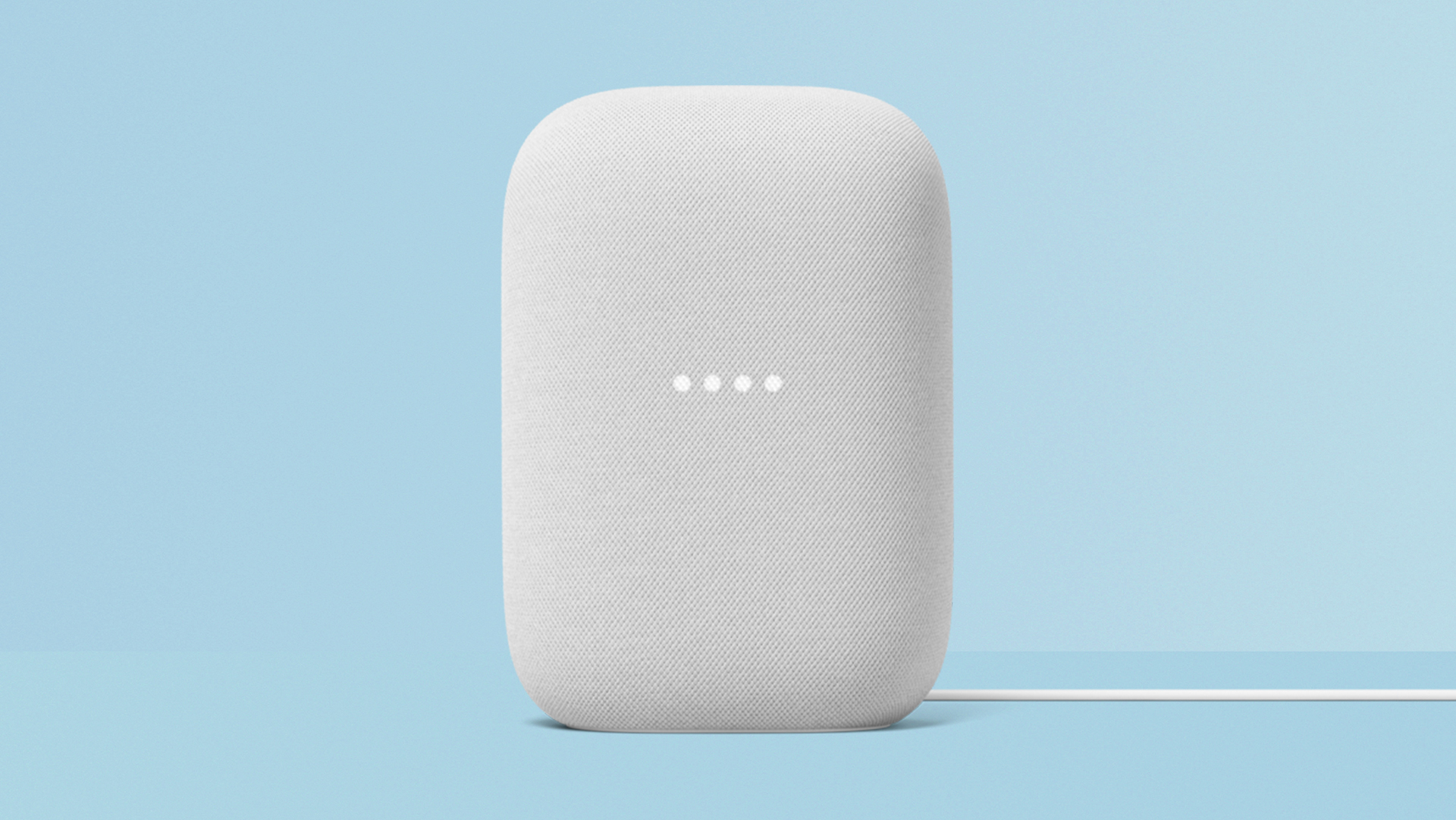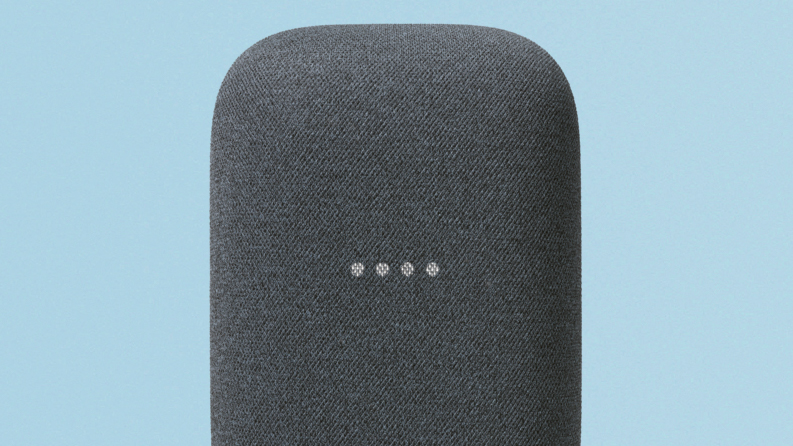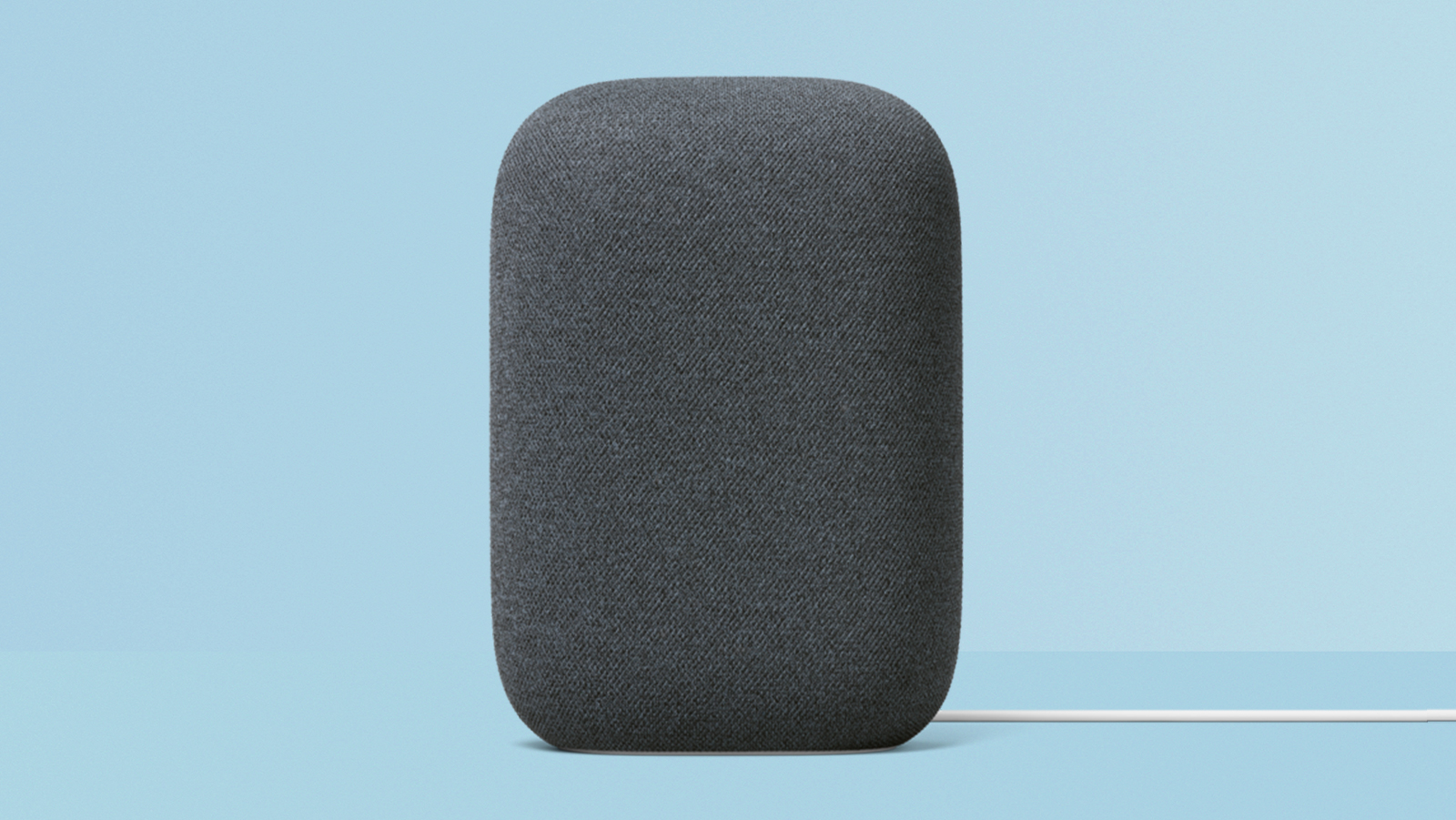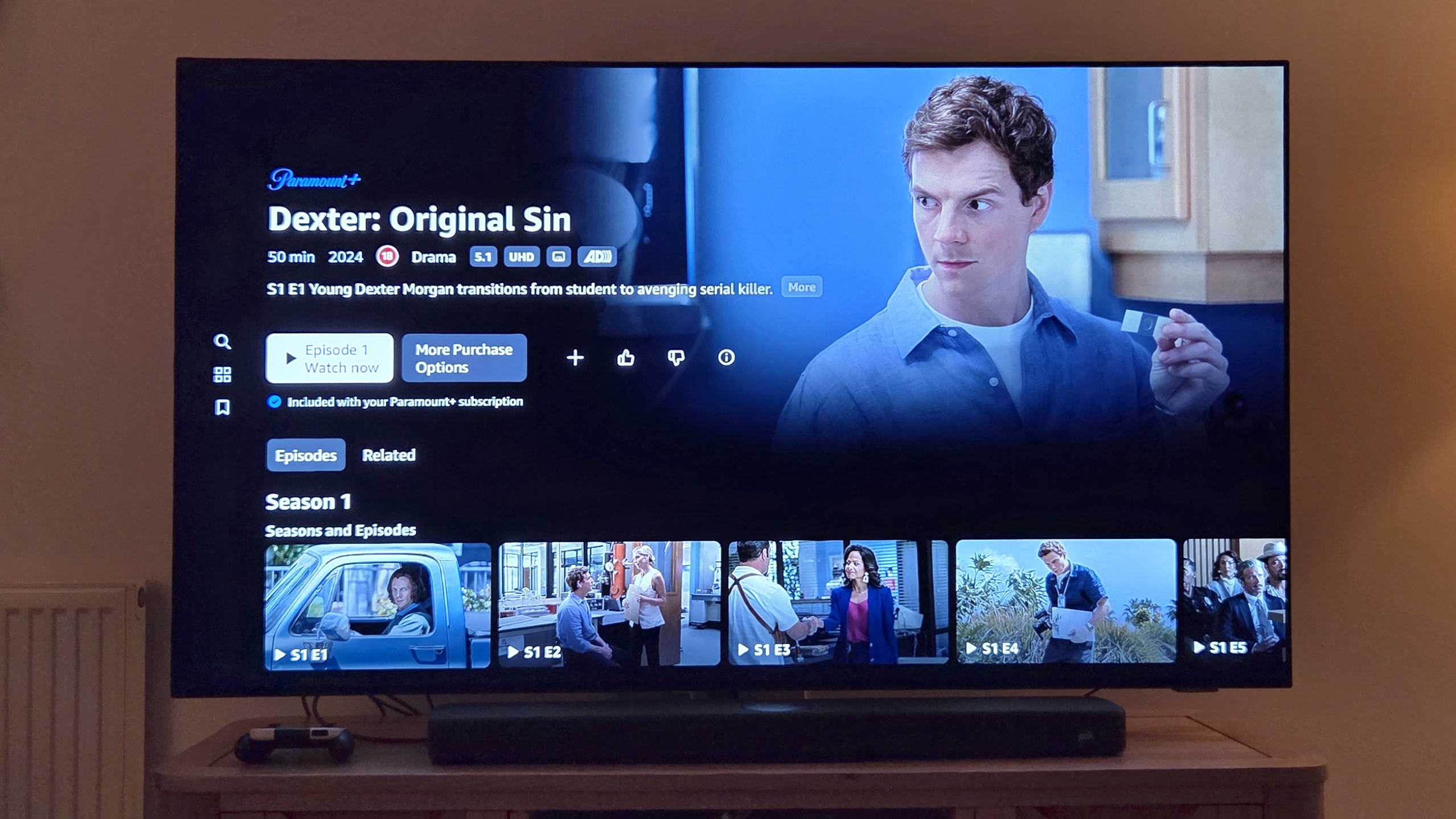Google Nest Audio review: a better-sounding Google Assistant smart speaker
The Nest Audio is Google's new mid-price smart speaker, but is it overshadowed by the new Amazon Echo?

The Nest Audio looks good and sounds good, though with some caveats for music lovers. For those deep in Google's ecosystem it's a great smart speaker.
-
+
Improved audio quality
-
+
Small, good-looking fabric design
-
+
Google Assistant is great for answers
-
-
Audio is thin and flat in the mid-range
-
-
Totally hidden control buttons
-
-
Only two colours in the UK
Why you can trust T3

Welcome to T3's Nest Audio review. Google has finally upgraded its Google Home smart speaker, and the Nest Audio is the direct replacement for it, coming in at the same just-under-£100/$100 price. This fabric-covered speaker has Google Assistant built in, and an improved speaker setup, aiming to find its way further up our list of the best smart speakers than its predecessor managed.
Recently, audio quality has become the big factor for smart speakers, with all the major players offering more expensive models that aim for hi-fi quality. But the Nest Audio and new Amazon Echo (4th gen) have both increased their speaker power in the new mid-range models too, with the Nest Audio focusing on this element so much that it's right in the name.
So let's dig into how successful it is, and how it compares to the competition – though don't forget that the Nest Audio is currently cheaper than usual thanks to Black Friday. You can find the latest prices on this page, but we've got it (and more) smart speakers in our round-up of the best Black Friday deals.
Google Nest Audio Review: Price, release date and design
The Google Nest Audio was released on October 15th 2020, and costs £89.99/$99.99/$AU149. That's basically in line with the norm for smart speakers, including both the Google Home it replaces, as well as the new Amazon Echo.
It's available in five colours: chalk (off-white), charcoal, sage (pastel green), sky (pastel blue) and sand (pastel pink). However, while all of those colours are available in the US, only chalk and charcoal are available in the UK and Australia.
The Nest Audio is smaller than it looks – it's under 5 inches wide, under 7 inches tall, is just about 3 inches deep. Between this and its subtle, fabric-coated design, it can blend into your home pretty easily. It's also nice that the enclosure is made from 70% recycled plastic.
We think a lot of people will prefer this discreet rounded lozenge to the space-helmet look of the new Amazon Echo.
Our one issue with the design is the control buttons. You might have missed them on the pictures because… well, they're totally invisible. You can tap the left side of the unit to reduce volume, or the right side to raise it, and the top centre to pause/play.
Obviously, you get instructions that explain this, but we're really not fans of controls with absolutely zero indications that they're there. Someone visiting your house should really be able to turn down the volume without guesswork.
The four lights of Google Assistant are prominent on the front, appearing from nowhere when you invoke the smart features, but also appearing when you change the volume.

Google Nest Audio review: Sound quality
The treble can be quite detailed and stands clearly out of the rest of the mix, but it feels like it's working a tad too hard to get there in some cases. It can get a bit peaky and harsh, particularly in some percussion, or in some higher-pitched voices – and especially when the two mix.
This won't come up strongly in every song you listen to, but when it does occur the Nest Audio is audibly struggling, and the naturalness of the sound falls away as the sound hits its head hard on the roof of what the unit is capable of.
Bass is sufficient – it's full enough to feel like it's anchoring the songs the way it should, but it's not especially precise or driven. But that's fine for a fairly small unit – physics isn't on the Nest Audio's side, yet it does its job, and fills out the low end of songs well enough.
The mid-range is where we're frustrated – it's just too thin, leaving songs feeling punchy at the high-end and on solid bass foundation, but deflated in the middle.
It robs songs of a portion of their energy and liveliness. A bassline should bounce its way from the low-end into the mid, but it slips away into the background instead. A piano chord should resonate across the treble and mid, but lacks the full-bodied hit it would get from a stronger mid-range.
Google says that the audio adjusts itself based on the room it's in (a feature normally found on higher-end speakers), and also tweaks the EQ depending on whether you're listening to music or podcasts/audiobooks and so on.
We're being fairly picky overall here, because the audio quality is still definitely good overall, particularly for the size and price. You'd have to spend a chunk more and go bigger to dramatically improve it – and that will apply doubly since (like all smart speakers), people will probably buy this mostly when it's on sale, and so even cheaper.
However, it is called the Nest Audio, and Google is pitching it based on its sound prowess, touting how much louder it is, and how much fuller its bass is, than the older Google Home.
Google also talks about the ability to have it in a stereo pair for more oomph, but that won't change the fundamental problems with the sound. At that kind of price, we'd rather have a single Sonos One than two Nest Audios.
Google Nest Audio review: features & smarts
The Nest Audio is fairly simple when it comes to features. It has an array of mics to pick up your voice for Google Assistant, as well as a switch on the back to physically disconnect the mics, if you prefer.
It works as a part of a Chromecast multi-room system, and it's easy to set up the unit itself and multi-room audio control through the Google Home app. It took about a minute for us, with no dramas at all getting it connected to the Wi-Fi – the app finds the speaker, and then takes you through the options.
After that, you can ask it your questions, or to play music and so on. You can also Cast to it from your phone/tablet/PC – this worked as well as you'd hope for us.
Google Assistant works excellently here, with the mics picking up the 'Hey Google' trigger reliably even over plenty of music noise, and responding rapidly.
The merits of Google Assistant are the same here as elsewhere – it and Alexa are mostly neck and neck when it comes to day-to-day usefulness.
• Google Assistant vs Alexa: the merits of both explained
As a smart speaker, the Nest Audio works as well as expected – it's not really an improvement over the Google Home, but this category hasn't transformed drastically anyway, so that's okay. The new Amazon Echo includes a Zigbee smart hub for home control, so that can be a significant smart home advantage, but only if you use it. For some people, it would be unnecessary anyway.

Google Nest Audio review: Verdict
The Nest Audio is a really solid smart speaker – much better audio quality than its predecessor makes it a clear upgrade, and we love the design (even if it's annoying that some countries don't get all the new colours).
As a music speaker, it's merely good rather than great. Most people will get on well with it, but more discerning music fans will find it lacking in just a few key areas. Considering its small size, we can forgive this.
The decent sound quality is mixed with the responsiveness and impressive knowledge and understanding of Google Assistant, and seamless setup and integration with other Chromecast multi-room devices. For those in the Google ecosystem who really benefit from using Assistant over Alexa, it's a great little device.
Google Nest Audio review: Also consider
Obviously, the main competitor to the Nest Audio is the new Amazon Echo, also just released. At the time of writing, we haven't been able to test it yet, so we can't speak to how they compare for audio quality – it has a woofer around the same size, but has two tweeters instead the one in the Nest Audio. We're also less keen on the design from what we've seen so far. Read our Amazon Echo (4th gen) review for exactly what we thought of it.
Another option is Apple's HomePod, for those who like to use Siri. Siri is nowhere near as smart overall as Google Assistant, and this device is strictly for Apple users only, but the audio quality is miles above what the Nest Audio is capable of. That said, it also has a larger footprint, and is a lot more expensive. Our Apple HomePod review can tell you more. However, the Apple HomePod Mini is now around for the same price as the Nest Audio, and we'll have our review of that soon.
If you want a Google Assistant speaker that sounds better, there are two key options: the Sonos One (which you can configure to use either Alexa or Google Assistant), or Google's own Home Max speakers.
The Sonos One is a closer competitor to the Nest Audio, since it's only a little bigger (it's basically the same height and width, but is deeper). Its sound is more natural at the top end, and the balance is better overall, especially in the mid-range. But again it costs a load more.
The Google Home Max is a much bigger than the Nest Audio, but it fills that space with big, meaty speakers. It sounds just excellent, but (here's that theme again) costs more. Here's our full Google Home Max review.
Alternatively, if you've been reading our critiques of the audio quality and thinking "Who cares?", you could go cheaper. The Google Nest Mini is the low-price version of this speaker, with less fancy speakers – it sounds clear enough, though, and has the full Google Assistant experience.
Sign up to the T3 newsletter for smarter living straight to your inbox
Get all the latest news, reviews, deals and buying guides on gorgeous tech, home and active products from the T3 experts
Matt is T3's former AV and Smart Home Editor (UK), master of all things audiovisual, overseeing our TV, speakers and headphones coverage. He also covered smart home products and large appliances, as well as our toys and games articles. He's can explain both what Dolby Vision IQ is and why the Lego you're building doesn't fit together the way the instructions say, so is truly invaluable. Matt has worked for tech publications for over 10 years, in print and online, including running T3's print magazine and launching its most recent redesign. He's also contributed to a huge number of tech and gaming titles over the years. Say hello if you see him roaming the halls at CES, IFA or Toy Fair. Matt now works for our sister title TechRadar.
-
 New Tiffany & Co Bird on a Flying Tourbillon watch is like nothing you've seen before
New Tiffany & Co Bird on a Flying Tourbillon watch is like nothing you've seen beforeIt's a stunning, summery watch
By Sam Cross Published
-
 I love the Murderbot books, and Apple TV+'s first trailer has me excited
I love the Murderbot books, and Apple TV+'s first trailer has me excitedMurderbot is a series I can't wait for
By Max Freeman-Mills Published
-
 I did the unthinkable and subscribed to Paramount+
I did the unthinkable and subscribed to Paramount+Hear me out: Paramount+ is worth paying for right now
By Mike Lowe Published